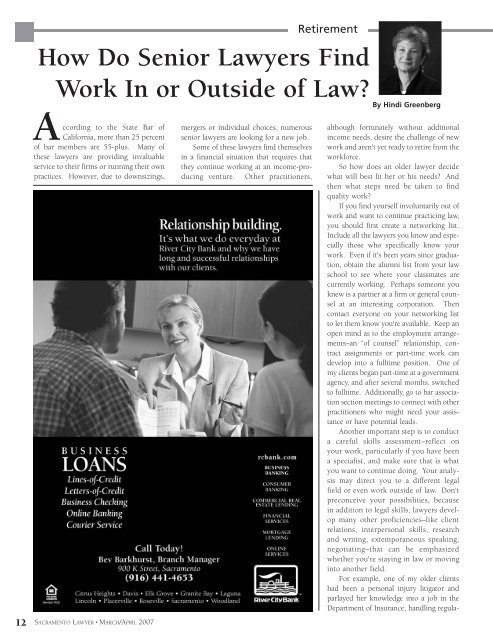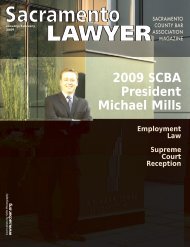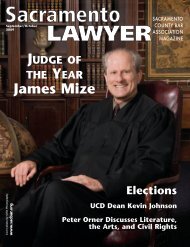March / April 2007 - Sacramento County Bar Association
March / April 2007 - Sacramento County Bar Association
March / April 2007 - Sacramento County Bar Association
Create successful ePaper yourself
Turn your PDF publications into a flip-book with our unique Google optimized e-Paper software.
Retirement<br />
How Do Senior Lawyers Find<br />
Work In or Outside of Law?<br />
A<br />
ccording to the State <strong>Bar</strong> of<br />
California, more than 25 percent<br />
of bar members are 55-plus. Many of<br />
these lawyers are providing invaluable<br />
service to their firms or running their own<br />
practices. However, due to downsizings,<br />
12 SACRAMENTO LAWYER ■ MARCH/APRIL <strong>2007</strong><br />
mergers or individual choices, numerous<br />
senior lawyers are looking for a new job.<br />
Some of these lawyers find themselves<br />
in a financial situation that requires that<br />
they continue working at an income-producing<br />
venture. Other practitioners,<br />
By Hindi Greenberg<br />
although fortunately without additional<br />
income needs, desire the challenge of new<br />
work and aren't yet ready to retire from the<br />
workforce.<br />
So how does an older lawyer decide<br />
what will best fit her or his needs? And<br />
then what steps need be taken to find<br />
quality work?<br />
If you find yourself involuntarily out of<br />
work and want to continue practicing law,<br />
you should first create a networking list.<br />
Include all the lawyers you know and especially<br />
those who specifically know your<br />
work. Even if it's been years since graduation,<br />
obtain the alumni list from your law<br />
school to see where your classmates are<br />
currently working. Perhaps someone you<br />
knew is a partner at a firm or general counsel<br />
at an interesting corporation. Then<br />
contact everyone on your networking list<br />
to let them know you're available. Keep an<br />
open mind as to the employment arrangements–an<br />
“of counsel” relationship, contract<br />
assignments or part-time work can<br />
develop into a fulltime position. One of<br />
my clients began part-time at a government<br />
agency, and after several months, switched<br />
to fulltime. Additionally, go to bar association<br />
section meetings to connect with other<br />
practitioners who might need your assistance<br />
or have potential leads.<br />
Another important step is to conduct<br />
a careful skills assessment–reflect on<br />
your work, particularly if you have been<br />
a specialist, and make sure that is what<br />
you want to continue doing. Your analysis<br />
may direct you to a different legal<br />
field or even work outside of law. Don't<br />
preconceive your possibilities, because<br />
in addition to legal skills, lawyers develop<br />
many other proficiencies–like client<br />
relations, interpersonal skills, research<br />
and writing, extemporaneous speaking,<br />
negotiating–that can be emphasized<br />
whether you're staying in law or moving<br />
into another field.<br />
For example, one of my older clients<br />
had been a personal injury litigator and<br />
parlayed her knowledge into a job in the<br />
Department of Insurance, handling regula-






